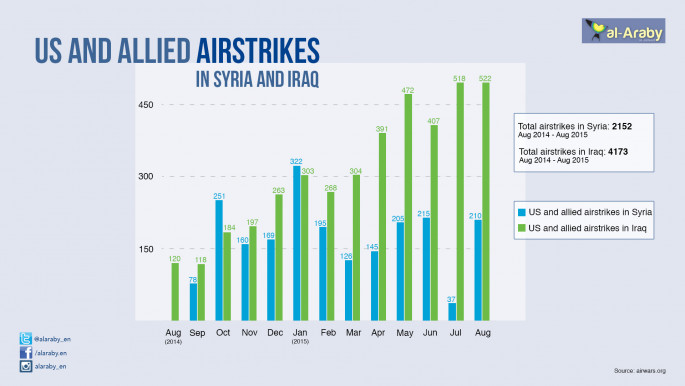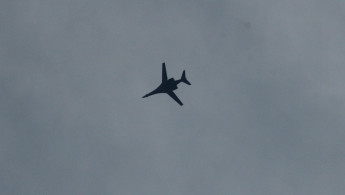Can airstrikes eventually defeat the Islamic State group?
The US-led coalition is intensifying its air raids against the Islamic State group (IS) in Syria, as the effectiveness of the past year of the aerial campaign is questioned.
US intelligence officials - and others - recently admitted that almost a year of coalition airstrikes had not demonstrably weakened the IS group.
"The present situation is not acceptable," said one senior European diplomat. "I detect a growing feeling that we're not winning this at the moment and we need to redouble our efforts collectively."
The diplomat added: "A number of Western governments are looking at a combination of the humanitarian crisis, the failure to resolve the situation in Syria and the continued activity... of [IS], and concluding that we need to do more."
Iraq has been the main theatre for the coalition's $4 billion air campaign against the IS.
Two-thirds of the 6,700 airstrikes carried out since August 2014 have taken place inside the country.
Little to show
| I detect a growing feeling that we're not winning this at the moment and we need to redouble our efforts collectively - Senior European diplomat |
Meanwhile, the Pentagon has opened an investigation into allegations of more than 50 intelligence analysts that their reports were being altered by senior officials to put a better gloss on the results of the airstrikes on the IS and the Nusra Front, al-Qaeda's branch in Syria, the Daily Beast reported.
In a written complaint, two senior analysts claimed that reports were changed to portray the groups as weaker than they actually were to support the US administration's claim it was winning the battle.
There is a clear parallel with the charge levelled at the previous US administration of George W Bush - that it manipulated evidence on former Iraqi leader Saddam Hussein's weapons of mass destruction programmes.
 |
|
In July, retired US General John Allen, the special presidential envoy for the global coalition to counter ISIL [IS] stated simply: "The IS is losing."
But by the end of that month, US intelligence agencies admitted that IS had not been significantly weakened over the past year by the coalition air raids.
Some current and former US figures said the rules of engagement for the coalition's aircraft were overly restrictive.
A New York Times article in May said there were only an average of 15 airstrikes a day against the IS in Syria and Iraq, noting that by comparison, the 2003 Iraq war saw more than 800 per day.
Chairman of the Senate Armed Services Committee, Senator John McCain also said in May that only one in four missions actually resulted in a target being attacked.
Adapting to the air raids
The IS group has displayed considerable flexibility and has adapted its tactics to lessen the effectiveness of airstrikes by avoiding a build-up of its forces for long periods of time.
The IS' concentration of its forces in its extended siege of the Syrian Kurdish city of Kobane, which ended in January this year, made them easy targets for coalition air power.
The group has since tended to favour faster attacks, often employing innovative tactics.
The fall of the Iraqi city of Ramadi to the IS in May this year was a case in point.
While US officials initially blamed the Iraqi forces' unwillingness to hold their ground, some later admitted that Ramadi's defenders were organised and determined - but the IS was resourceful, brutal and determined, the Wall Street Journal said.
The IS concentrated its forces for the attack on Ramadi without using obvious or easily targeted military convoys, often blending its fighters' movements into local civilian traffic.
They enforced a media blackout on its normally very active propaganda arm.
The group also employed a devastating new weapon, converting captured US armoured vehicles into car bombs, each loaded with tons of high explosives. The armour plating meant that defensive fire would probably not cause them to detonate before they reached their targets.
At least 27 of these mobile armoured bombs were deployed in the attack on Ramadi, destroying not just checkpoints and the security perimeters of Iraqi forces but also entire city blocks.
| At least 27 of these mobile armoured bombs were deployed in Ramadi, destroying entire city blocks |
Iraqi Prime Minister Haidar al-Abadi told the BBC Iraqi forces had "the will to fight, but when they are faced with an onslaught by [IS] from nowhere... With armoured trucks packed with explosives, the effect of them is like a small nuclear bomb".
Writing on the War is Boring blogsite, Robert Beckhusen argues that the IS has learned not to defend territory, as stationary defenders are vulnerable to airstrikes.
Instead, the group will employ snipers and improvised explosive devices to slow down attackers and make their advance costly and then, if they have the capacity to do so, launch a counter-attack against the attacking force.
Mission creep?
Western officials are now hoping for a fresh show of resolve in the campaign against the IS group when coalition members meet on the margins of the UN General Assembly later this month.
Coalition countries have already begun to publicly pledge further support, and more is expected.
"Any additional force and any additional firepower to the coalition is looked at positively," said a US military official speaking on condition of anonymity.
But the exact scope of the new commitments and their possible impact remain unclear.
"National commitments on paper include large caveats about when, where and how countries will use air power," said Micah Zenko of the Council on Foreign Relations.
The measures are unlikely to include the use of ground combat troops, something US President Barack Obama's administration has repeatedly ruled out.
An Iraqi parliamentarian who requested anonymity told al-Araby al-Jadeed it was likely US forces would start returning to Iraq by the end of this year if no progress was made against the IS.
"Washington has informed the government that it is ready to help Iraqis in any way they choose to eliminate terrorists, so we expect the US to respond to any Iraqi request in this regard," he said.



